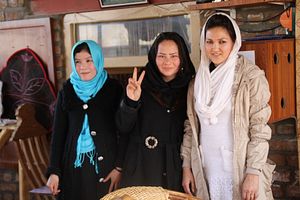The Bamiyan Women’s Café is tough to spot, tucked away in a tiny corner of the historic Afghan city. Even if you’re looking for it, there’s a good chance you might miss the lively little shop. That’s too bad; it’s one of the most dynamic places for the women in Bamiyan.
Though women largely play second fiddle to men in Afghanistan’s Islamic households, their exposure and public role unappreciated, Bamiyan Women’s Café openly defies that stereotype. It’s an effort by local women to assert their presence in a society dominated by men.
Bamiyan Women’s Café is the first shop of its kind in Afghanistan, openly inviting the area’s normally oppressed women to come out and find “A Room of One’s Own,” an ode to a revealing new essay on the country’s gender divide by the Café’s owner, 23-year-old author Qandi Gul Kazimi.
“In Afghanistan, you have all kinds of restaurants: family eateries, cafés for men; but there aren’t any eateries for women where they can be themselves,” Kazimi says. She recently graduated with a degree in media studies from Kurukshetra University, just over a hundred miles north of India’s capital, New Delhi.
“My education in India was eye-opening. It helped me understand what women’s freedom meant. Girls in India are very liberal, they are very mobile, they can pursue any path without obstacles. I want the same things for Afghanistan,” Kazimi adds.
Kazimi also believes that Afghan women have a greater role to play in the country’s nascent economy. “Women in my country want to improve themselves, demonstrate their talents to the world but there is no avenue to hone their skills.” At the Women’s Café, she offers patrons an opportunity to do just that. “My café is an attempt to give the women their space, it also serves as a platform for women to bring their handmade products to the café and sell here.”
Bamiyan Women’s Café opened eight months ago, with assistance from a German NGO called HELP. Within a couple of months, Kazimi assumed control of the business. She’s been running the place on her own ever since. The café employs seven women.
The café has an air of tranquility, a stark contrast with much of the war-torn country. Traditional Afghan decorations are interspersed with local images and motifs. Afghan food isn’t the only thing on the menu: Indian dishes are also popular among patrons, demonstrating Kazimi’s affinity with the country where she spent four formative years. The café also displays handmade products made by local women. The space also allows female entrepreneurs to discuss issues of business and society.
This makes the café a very unique place, not only for Bamiyan, but for the whole country. Kabul hosts many progressive and liberal women, but a place like the café would be almost unheard of. Women in the capital are organized, but operate clandestinely.
“Women should be more open about their demands and needs. They should not care what others think about them. You cannot satisfy everyone. You should be happy with yourself,” Kazimi says. She hopes the café will help project a positive image of Afghanistan to the rest of the world.
Kazimi says she isn’t afraid of being so outspoken and bold, even in a society where feminism invites the attention of insurgents.
“Times have changed,” Kazimi notes. “10 to 15 years ago, women used to live in closets in Bamiyan, but it’s not the case anymore. Education is changing the mindset of Afghan women. We’re becoming more liberal and open,” she explains. Before starting the café, Kazimi worked in the Ministry of Women’s Affairs in Kabul.
Bamiyan is about 250 kilometers northwest of Kabul. Most travelers prefer making the trip by air; Taliban militants dominate many of the roads in this part of the country. Without regular commercial flights, reaching this beautiful valley is fairly difficult. There is no security issue in Bamiyan, once a flourishing center of Hindu and Buddhist art, but volatility in the rest of Afghanistan adversely impacts the surrounding mountainous area.
“Afghanistan’s security is a major concern for us. It directly impacts our tourism,” Kazimi says. She hopes to expand the franchise of women’s cafés in other parts of the province. “I have plan to set up one café near the site of the Bamiyan Buddha and another at Band-e-Amir, Bamiyan’s most beautiful natural lake.”
On March 8, International Women’s Day, Kazimi organized an event to distribute coupons to Afghan businesswomen, which will act as a club membership and promote affinity with the café.
Whether she knows it or not, Kazimi seems to be laying down the foundation of a coffee house culture in Afghanistan, where minds can meet and exchange ideas. As I departed, a group of young female skiers entered the café in track pants and suits and head scarves, and ordered coffee and french fries. They had just returned from the slopes after participating in Afghanistan’s skiing championship.
Afghanistan is more than what meets the eye. There is a world which lies away from the attention of the international community. Qandi Gul Kazimi wants to showcase that world. For her, that’s the only way to put down the insurgency.
































